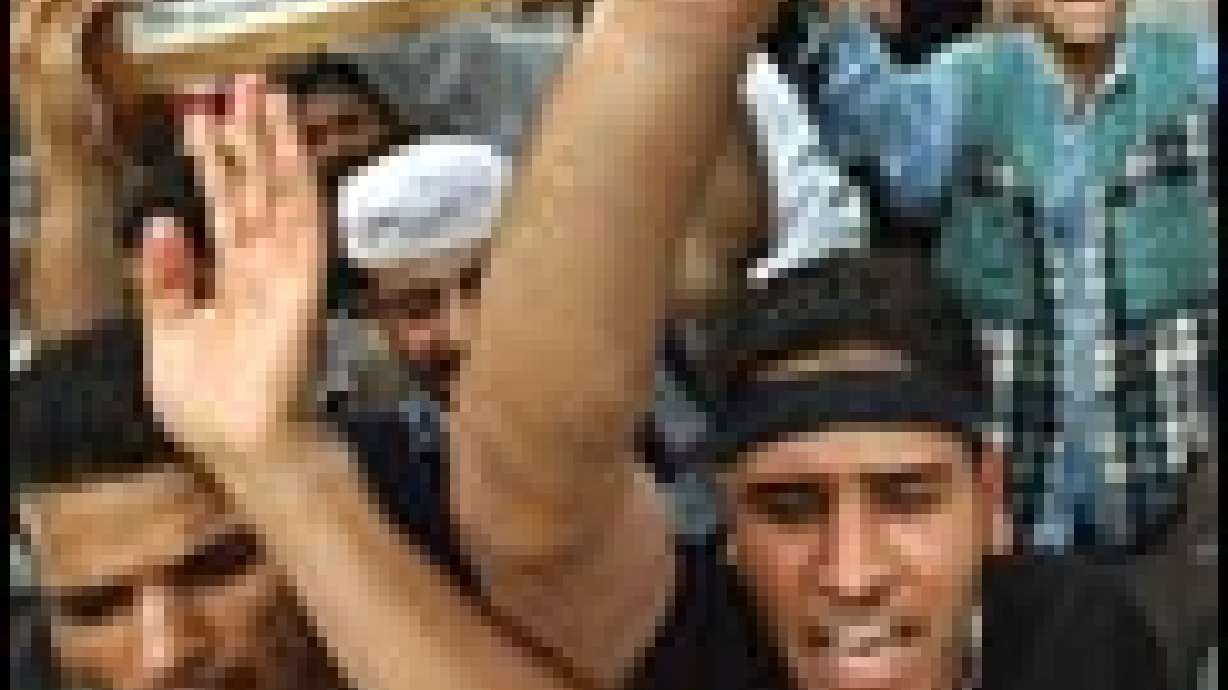Estimated read time: 4-5 minutes
This archived news story is available only for your personal, non-commercial use. Information in the story may be outdated or superseded by additional information. Reading or replaying the story in its archived form does not constitute a republication of the story.
BAGHDAD, Iraq (AP) -- Iraq's most influential Shiite cleric Friday urged his followers to stop holding demonstrations for early elections until a U.N. team decides whether polls are feasible.
The call by Grand Ayatollah Ali al-Husseini al-Sistani is good news for the U.S.-led administration, which says early elections to choose an Iraqi government are impossible because of the country's precarious security.
Underlining the U.S. concerns, a bomb planted at an Iraqi Communist Party office Thursday killed two men in an apparent attack on supporters of the U.S.-backed government.
Nine other people including two American soldiers were killed in attacks by pro-Saddam Hussein insurgents on U.S. forces, Iraqi civilians and Iraqi police in an upsurge of violence after relative calm during the last two weeks.
While trying to control the violence, the U.S.-led coalition is grappling with opposition to its plan to hand over power to a transitional government July 1 and end its occupation.
The plan calls for holding regional caucuses in Iraq's 18 provinces to select a legislature, which in turn will choose a provisional government.
Al-Sistani, who is the spiritual leader of many of the country's majority Shiites, has rejected the idea of a non-elected government and demanded early elections. His call has been followed by massive demonstrations in several Iraqi cities.
In recent days, however, al-Sistani has indicated that he will accept the verdict of a U.N. team, which Secretary-General Kofi Annan is considering sending to judge whether elections are feasible.
On Friday, addressing a prayer group in the holy city of Karbala, al-Sistani said no protests should be held until the United Nations' position has become clear, and "after that we will say our word."
Abdul-Mehdi al-Karbali, a representative of al-Sistani, quoted the cleric as saying: "This issue concerns all the sects that comprise the Iraqi people. Sunnis, Christians and all other sects are urged to support the (Shiite) religious order in its position, so that the occupation forces will not adopt any steps that serve their interests and that do not serve the interests of the Iraqi people."
Protests should be held later, if they are still necessary, he said.
Shiites, believed to comprise 60 percent of Iraq's 25 million people, were brutally suppressed during Saddam's regime, which was dominated by the minority Sunnis. Shiites fear that the caucus system will deprive them of their share of power.
During the weekly prayers Friday at Baghdad's biggest Sunni house of worship, the Abu Hanifa mosque, young men distributed booklets, describing Saddam as the true ruler of Iraq, and calling for an end to American occupation. Saddam was captured Dec. 13.
"Even if he is in captivity, there is still hope for his salvation," said the booklet, signed by unnamed "caretakers of Islamic laws."
"The Iraqi leader (Saddam) is immoral but not an infidel," the booklet said, adding that Muslims have the religious duty to "fight against those who go against the legitimate ruler" even if he was unjust.
Shiites have so far been generally supportive of the U.S. forces, who along with their supporters have largely faced attacks in the so-called Sunni Triangle, the central part of the country where Sunnis are in a majority.
Thursday's bombing of the local Baghdad office of the Iraqi Communist Party, which occurred one hour after a party meeting ended, was the first time the party has been attacked during the 10-month insurgency.
Mohammed Khudeir, a party official, said three party members were still in the office, clearing up, when the bomb went off, killing two and injuring one.
Since the fall of Saddam's Baath party, the Iraqi Communist Party has become the most organized political party in the country with dues-paying members and small offices nationwide. The party operated underground during Saddam's days, and openly in the northern Kurdish areas that were outside government control.
The bombing came as U.S. forces on Thursday arrested a father and son suspected of involvement in a mortar and rocket barrage on Wednesday that killed two American soldiers at a U.S. outpost.
Among the other victims of the latest violence were four Christian women who were slain Wednesday as they headed to jobs as laundry workers at a U.S. military base, 50 miles west of Baghdad.
They also appeared to have been killed as part of a campaign to discourage Iraqis from cooperating with the occupation forces.
Two Iraqi policemen were killed Thursday and three others were wounded when gunmen fired on a police checkpoint between Fallujah and Ramadi, two other insurgency hotspots west of Baghdad.
The security chief of Spanish troops in Iraq was shot and critically wounded Thursday during a raid south of Baghdad.
(Copyright 2004 by The Associated Press. All Rights Reserved.)









